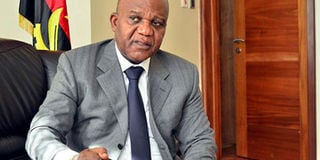Envoy: Angola on right path as it celebrates independence

Angolan ambassador to Kenya Samuel Sianga Abílio. Until the embassy was opened in Nairobi in 2015, Kenyans seeking to travel to Luanda had to get visas in Dar es Salaam. PHOTO | FRANCIS NDERITU | NATION MEDIA GROUP
What you need to know:
- Now, Luanda says it is ready to play its role in Africa.
- Angola voted for Kenya when the African Union endorsed its UN Security seat candidature back in August.
- Angola is a member of the Southern African Development Community, a bloc of 14 countries.
There was little that used to come out of Angola except that it has been Africa’s second biggest oil producer with an estimated 1.4 million barrels of crude production per day.
In its 44 years of independence, Angola has been stable and peaceful only since 2002, forcing it into a massive healing of war wounds; both economic and political.
Now, Luanda says it is ready to play its role in Africa.
“Angola had a very long time of struggle. Not only did we have foreign support but we also had support of African countries,” Mr Samuel Sianga Abílio, the Angolan ambassador to Kenya, told the Daily Nation last week.
“That also gave us a vision of what Angola’s role would be, in the context of Africa. Being an African country, we need to defend the interests of each other as we did recently when Kenya filed its candidature for the UN Security seat. We sup-ported the AU endorsement of Kenya,” added the diplomat, a chemical engineer who worked in his country’s oil industry for nearly three decades.
VOTED FOR KENYA
That Angola voted for Kenya when the African Union endorsed its candidature back in August may have been lost in the massive of 37 votes Nairobi garnered.
But the Angolan envoy told the Daily Nation, it was a statement of how his country wants to progressively built relations with Nairobi and other African countries.
Angola opened its embassy in Nairobi in 2015, a year after President Uhuru Kenyatta toured Luanda and met with then President José Eduardo dos Santos, where they signed four bilateral agreements.\
SADC MEMBER
Angola is a member of the Southern African Development Community (SADC), a bloc of 14 countries.
Angola is also a member of the International Conference on the Great Lakes Region, a grouping of 12 countries that also includes Kenya, and which seeks political stability.
In August, Angola’s new President João Lourenço brokered a political ceasefire between Rwandan President Paul Kagame and Uganda’s Yoweri Museveni, taking advantage of the good offices of ICGLR.
“We must maintain good relations with each other. Otherwise, our people cannot interact. They cannot trade, they cannot open contacts with one another and that means no development,” he said.
CIVIL WAR
Independent from Portugal since November 11, 1975, Angola soon plunged into a civil war that lasted for 27 years, while still maintaining tight connections to its former colonial rulers.
Since 2002, however, the country has enjoyed relative stability including passing a new constitution in 2010 that set a maximum of two five-year presidential term limits.
Yet Angola still depends on its oil for nearly 88 percent of its exports, and is a net importer of everything else. When President Lourenço came to power in 2017, his priority was to adjust his country’s economy away from total oil dependency, a fete the World Bank warned would be complex, but achievable.
OIL
“Based on the oil crisis of 2015, we have learnt that depending on a single product of exportation is not safe for the economy because of the volatility of the price,” he told the Daily Nation.
The crisis where prices per barrel fell below USD50 ate into the Angolan economy, he said, after oil investors backed away from putting money in new projects.
“The government decided to diversify the economy and boost the local production to guarantee the basic needs of the population. I will not say that all those needs have been met, but I will say that the vision has been set and we are head-ing in a good direction.”
LOAN
During the crisis, Luanda was forced into a USD3.7-billion loan from International Monetary Fund, which is currently demanding austerity measures such as reducing public debt, elimination of subsidies and devaluation of the currency.
Angola, the envoy argued is also learning governance from countries like Kenya which recently withdrew old 1000 bank notes in a bid to fight corruption and money laundering.
Ideally, this diversification is what could punctuate its relations with Kenya and others.
IMMIGRATION
Part of Angola’s bid to attract private investors in its other parts of the economy is to make immigration processes les tedious.
For example, the embassy said it will be launching a new website www.embassyofangolainkenya.org, “to get closer to our Kenyan brothers by providing general information and consular services”.
Until the embassy was opened in Nairobi in 2015, Kenyans seeking to travel to Luanda had to get visas in Dar es Salaam.
Today, the embassy says at least 50 visas are issued in Nairobi every month.
TRAVELLERS
“That is quite significant, but we want to increase that number and want to see more Kenyans travelling to Angola and more Angolans travelling to Kenya, both for business and leisure.”
In 2014, Kenya and Angola signed four agreements economic, scientific, technical and cultural co-operation, an MoU on Political Consultations between the Minis-try of External Relations of Angola and the Ministry of Foreign Affairs of Kenya, an agreement to establish a bilateral commission and an agreement on Operation of Air Services between and beyond their respective territories, which would allow direct flights and transiting.
Since then, Kenya Airways has been flying to Luanda three times a week, making the air services agreement the only deal fully implemented so far.
The remaining deals, the envoy said will be accomplished, but “the business peo-ple and private sector will play a bigger role’’.





